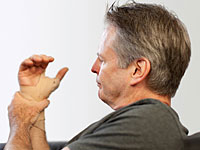
THURSDAY, April 28, 2011 (Health.com) — Arthritis can limit mobility and make everyday tasks painful, and it can also take a toll on your mental health and overall quality of life, a new study suggests.
Researchers analyzed data from several national health surveys conducted by the Centers for Disease Control and Prevention (CDC) and found that people with arthritis—which includes those with aging-related osteoarthritis and similar conditions such as rheumatoid arthritis and gout—tend to rate lower than their peers on measures of overall health.
Twenty-seven percent of the survey respondents with some form of arthritis described their health as “fair” or “poor,” versus just 12% of those without arthritis Those with arthritis also reported having more than twice as many “physically unhealthy days” in the previous month.
The surveys showed a similar pattern for mental health. People with arthritis experienced an average of five “mentally unhealthy days” per month, compared to three per month among those who were arthritis free, according to the study, which appears in Arthritis Care & Research.
“People who have arthritis, particularly rheumatoid arthritis, have significant rates of depression,” says Eric L. Matteson, MD, chair of rheumatology at the Mayo Clinic, in Rochester, Minn., who was not involved with the study. “And there’s no question that when you feel depressed, it influences your general sense of well-being and how arthritis affects you.”
Moreover, when arthritis is acting up, metabolic and other changes in the body can increase levels of inflammation, which can worsen depression, Dr. Matteson says. “That highlights the importance of not only controlling the disease or managing the disease but also getting depression under control, too.”
More than one-fifth of the U.S. population has some form of arthritis, according to the CDC. The rate has been rising, partly because of the aging of the baby-boom generation. But the obesity epidemic is also partly to blame, since excess weight can strain inflamed joints.
Physical activity was linked to a higher quality of life, the researchers found. People who managed to exercise in spite of their arthritis were 53% less likely to be in fair or poor health than were inactive arthritis patients, says the lead author of the study, Sylvia Furner, PhD, an epidemiologist at the University of Illinois at Chicago.
“Physical activity does a lot to strengthen and support the joints, and there’s a lot of pain relief that comes along with exercise,” says rheumatologist Allyson McDonough, MD, assistant professor of internal medicine at the Texas A&M Health Science Center College of Medicine, in Temple. Low-impact exercise—such as walking, swimming, yoga, or tai chi—is “extremely important to improve quality of life,” she says.
“There’s a significant perception that there’s nothing that can be done about arthritis,” says Dr. McDonough, who was not involved in the research. “That’s inaccurate. Seeking care and looking for avenues of self-help will help improve quality of life.”





